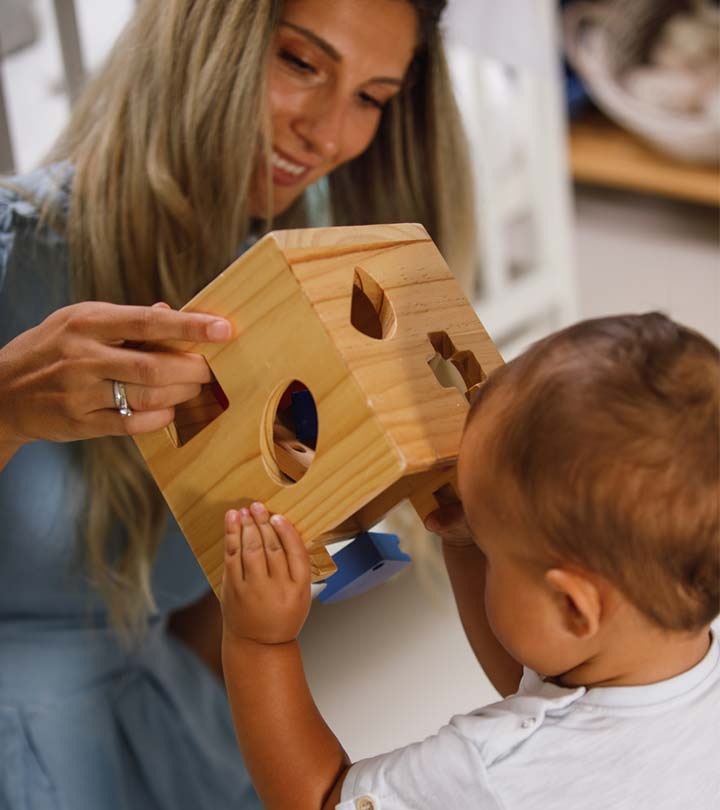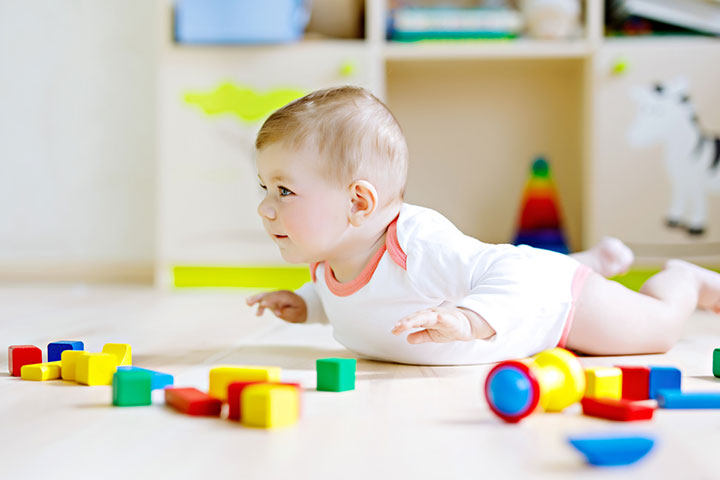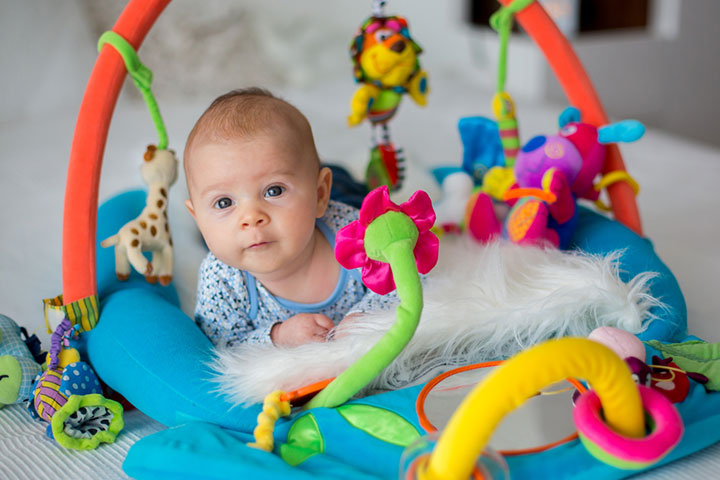Cognitive activities for infants can strengthen their ability to think, communicate, and analyze. A child’s cognitive development happens when they interact with their environment (1). Each interaction gives rise to new nerve connections in the brain.
In infants, cognitive development is seen when they grow curious and reach out with their hands to touch and feel things (2). In the first year, babies also start understanding language and develop bonds of love and trust. The way parents speak, play, cuddle or interact with their children also helps in the cognitive development of their children (2).
In addition, many theories of cognitive development have also been put forth by scientists such as Jean Piaget, Erikson, Bronfenbrenner, and others. This post lists some exciting activities that will help you develop your child’s cognitive skills.
10 Cognitive Development Activities for Infants
Every child is different and reaches their developmental milestones in their own time. These activities can help boost your infant’s cognitive development at different ages.
Cognitive activities for infants 0 to 3 months
A newborn baby is able to see objects around 12 inches from them, is sensitive to sounds nearby, and startles when they hear loud noises by kicking their legs, flailing their arms, and arching their back (3).
From one to three months of age, your child should be able to move their eyes as objects move, respond to startling and loud noises, follow objects such as rattle toys, recognize familiar people from a distance, and cry or fuss when they are bored or want to communicate. During their third month, an infant can recognize their mother’s breast or bottle when it is feeding time and learn to follow moving objects or people by turning their head.
Here are some cognitive development activities that are apt for infants:
1. Read to your infant
Reading to your baby has many benefits, and it is never too early or late to start. Children benefit from being read to from a very young age (4). Reading to your newborn makes them better at recognizing voices and sounds, while showing them picture books with bright colors helps in their cognitive development.
2. Talk to your baby
At 0 to 3 months of age, your baby is way too young to speak or converse with you. However, you can still try talking to your baby, look at them and smile, and have regular conversations with them. Notice how your baby will listen to you intently.
Having conversations with your baby and talking to them helps in developing language and communication skills (5). Your baby may also respond to you by vocalizing distinct sounds.
3. Hang a moving rattle over their crib
Hanging a moving rattle, or mobile, over your baby’s crib or within their reach during tummy time encourages them to reach out for it. This helps them move their hands and legs while enabling them to hold their head (5).
4. Sing to your baby
Singing to your baby has multiple benefits for your baby. It helps in developing a bond and in making connections with your baby. It helps in teaching them new words and rhythms and improves their listening skills–all of which help in their cognitive development (6).
Cognitive activities for infants 3 to 6 months
By the time your baby turns four or five months old, they develop a sense of self-discovery. They are more interested in exploring their surroundings as they begin to understand that they can influence things around. They are even able to appreciate interactive toys.
At this age, your infant is better at expressing emotions. They are able to communicate if they are happy or sad. They look at you when you are feeding them, and reach out for toys and other objects with their hands. They are also interested in exploring objects. By six months of age, your infant is also able to transfer objects from one hand to the other and reach for things around them.
Try these cognitive development activities for this age group.
1. Encourage object play
When your infant turns around four to five months of age, manipulating objects helps them understand ‘cause and effect’ in play. They may drop things on purpose to get your reaction. By observing your reaction they understand if they have done something right or wrong. If they see you smiling, they are encouraged to do it more and when you frown they slowly understand something is wrong. Give them objects such as small boxes, balls of different sizes, spoons, and plastic cups to encourage object play. Ensure that the objects are not potential choking hazards.
2. Provide age-appropriate interactive toys
Once your child is acquainted with the cause-and-effect relationship of certain activities, it is a good time to introduce age-appropriate interactive toys that follow this principle. For example, introduce them to interactive toys with buttons that open the doors or create music. Seeing the result of the action, such as when they press a button, can help strengthen your baby’s self-confidence.
3. Introduce them to different textures
As your child begins to use their hands more for grasping objects or reaching out for them, introduce them to different types of textures such as wool, velvet, and corduroy in the form of textured balls or activity boards meant for this purpose (7). This helps them in discovering different types of objects and textures. Also, allow them to understand them in their own way.
4. Water play
Engaging in water play can enhance children’s cognitive skills. It engages their senses and helps them to concentrate and solve problems. With water play, infants also learn to share and cooperate with others (18). A slightly messier water play can be enjoyable for infants demonstrating greater control over their gross motor skills. For this, lay down towels indoors or fill a container with water and toys. A baking pan controls water depth, while a storage bin provides a more immersive experience. Enhance visual engagement by adding organic colors or glitter. You may also incorporate exciting toys to make the play more engaging. Slippery, floating objects can capture your infant’s attention. Moreover, you may use tools like spoons or colanders to scoop water, which adds an extra layer of fun.
Cognitive activities for infants 6-12 months
Between six and twelve months of age, an infant’s cognitive abilities develop rapidly and they can use their hands more, transfer objects between both hands, turn book pages, look for objects that you hide, put and pull out things from containers, They are able to make sounds using objects they have, and start responding to simple commands (3).
Here are some activities that can help in boosting your infant’s cognitive abilities and developing motor skills in this age.
1. Stacking
A stacking game is great for infants between six and twelve months of age. You can get different types of stacking cups or containers. Teach your infant how to stack objects.
You can also play a stacking game where both of you may stack objects at the same time. Apart from learning the cause-and-effect concept, your child also develops fine motor skills through this activity.
2. The disappearing cheerio
At around seven to eight months of age, infants learn the concept of object permanence as per Jean Piaget’s theory (8). This concept posits that the object exists even when it is hidden. The disappearing cheerio and peek-a-boo are good games to help your infant develop this concept. They may even start pointing at things to indicate its hidden presence. These activities develop attention skills, memory, and object permanence in your infant. They may even start imitating you by babbling and making hand gestures.
3. Container play
As your child begins to sharpen their grabbing, gripping, and motor skills, give them different toys in a container. Your infant may reach out for a few toys or overturn the entire container and observe the toys rolling out or producing rattling noise.
Make this a habit every day and allow your infant the independence to pick out toys they would like to play with. By making choices they learn the effects of their actions. As your infant grows older, you can teach them to put the toys back into their containers. Any type of container play is intriguing for an infant and boosts their cognitive abilities.
Grabbing toys helps children improve their hand-eye coordination, resulting in improved fine motor skills. Kayla Carnahan, a mother and a blogger, shares how such toys are a favorite with her children. She says, “Offer your baby some things to hold with some very thin parts that are easy for them to manipulate. My absolute favorite for all three of my kids is this ‘o’ ball. This ‘o’ ball has lots of different holes and very thin parts, so it’s very easy for your baby to hold on to. Lace their little fingers in and practice holding (i).”
Cognitive development in babies starts from the time of their birth. As they interact with their surroundings, their ability to think, interpret, and express. You may help develop this ability further by introducing cognitive activities for infants that will help their understanding and communicating abilities. Since children achieve different milestones at different ages, you may plan the activities according to your baby’s age. For example, reading a book or talking may be used for children from zero to three months, while stacking and container play for children from six to 12 months. Experimenting with different activity ideas may allow your babies to learn and develop better.
Key Pointers
- Selecting age-appropriate activities is vital for infants’ cognitive development and offers proper stimulation.
- 0 to 6 months infant activities can stimulate them to respond to sounds and reach out to things they like.
- 6 to 12 months infant activities may enhance their ability to look for hidden objects and understand simple instructions.
Learn about the cognitive milestones for infants and toddlers. Discover how they develop and grow!















